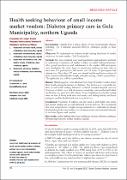| dc.contributor.author | Loum, Constantine S.L. | |
| dc.contributor.author | Wanyama, Ronald | |
| dc.contributor.author | Anywar, Denis | |
| dc.contributor.author | Odongkara, Beatrice M. | |
| dc.contributor.author | Odongo, Pancras | |
| dc.date.accessioned | 2021-07-28T18:05:48Z | |
| dc.date.available | 2021-07-28T18:05:48Z | |
| dc.date.issued | 2020 | |
| dc.identifier.citation | Loum, C. S., Wanyama, R., Anywar, D., Odongkara, B. M., & Odongo, P. (2020). Health seeking behaviour of small income market vendors: Diabetes primary care in Gulu Municipality, northern Uganda. South Sudan Medical Journal, 13(2), 95-98. | en_US |
| dc.identifier.uri | https://hdl.handle.net/123456789/299 | |
| dc.description.abstract | Introduction: Uganda faces a serious threat of non-communicable diseases
including type 2 diabetes; sedentary lifestyles predispose people to these
diseases.
Objective: To understand the diabetes health seeking behaviour of market
vendors at the main market, Gulu Municipality.
Method: This cross-sectional study used quantitative and qualitative methods
to understand experiences of market vendors on health seeking behaviour.
After general sensitization and mobilisation in the market, 400 participants
were enrolled for the study, however quantitative analysis was done only on
data from 375 participants (316 women and 59 men); 25 participants had
missing data; 30 of these 375 were interviewed and the qualitative analyses of
their responses offered further insight on health seeking – and is reported here.
The qualitative data will be reported later.
Results: Mixed responses were obtained from these 30 market vendors about
their health seeking behaviour for diabetes. The factors were responsible for
their overall health seeking behaviour included crowded hospitals and low
frequency of clinic days; lack of accurate knowledge, and uninformed beliefs
on diabetes, and poor work-life balance. Major impediments to health seeking
were the fear of losing work time and money, and feeling healthy and hence
seeing no need for health check-ups or medical care.
Conclusion: Awareness of diabetes and the need to seek health care exists,
but market vendors are not well informed on tests and care. We recommend
that more comprehensive simple-message sensitisation is undertaken to change
health seeking behaviour and prevent escalation of non-communicable diseases
in northern Uganda and beyond. | en_US |
| dc.language.iso | en | en_US |
| dc.publisher | South Sudan Medical Journal | en_US |
| dc.subject | health seeking behaviour | en_US |
| dc.subject | healthcare services | en_US |
| dc.subject | diabetes | en_US |
| dc.subject | sedentary lifestyle | en_US |
| dc.subject | hypertension | en_US |
| dc.subject | market vendors | en_US |
| dc.subject | Uganda | en_US |
| dc.title | Health seeking behaviour of small income market vendors: Diabetes primary care in Gulu Municipality, northern Uganda | en_US |
| dc.type | Article | en_US |

